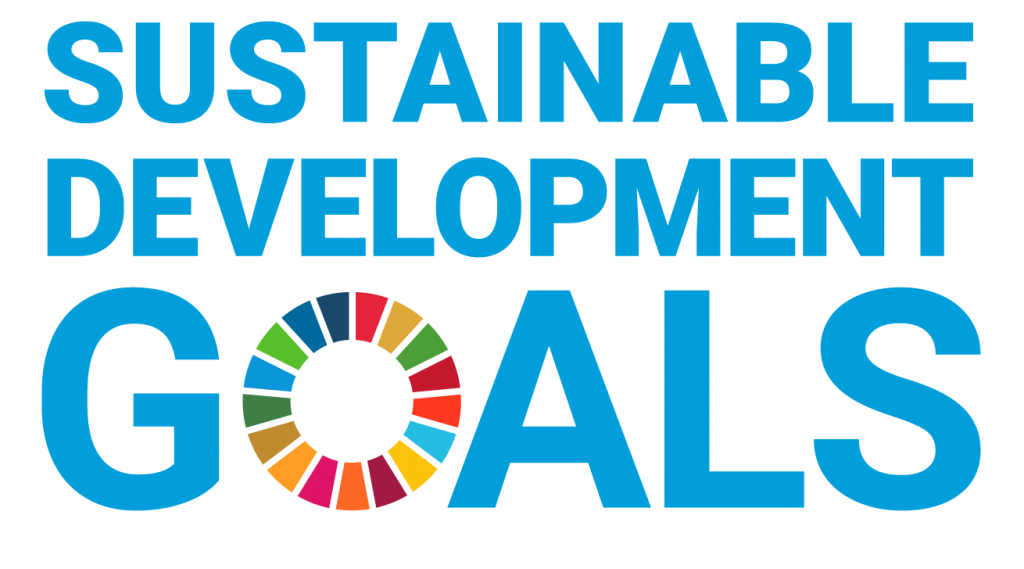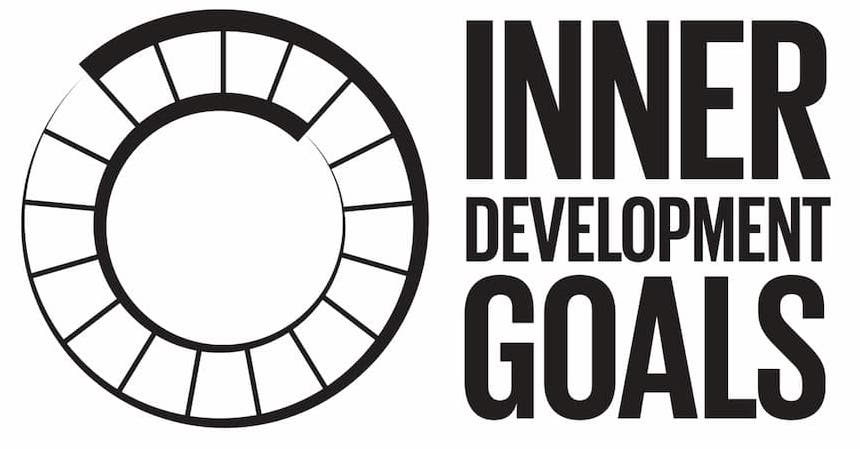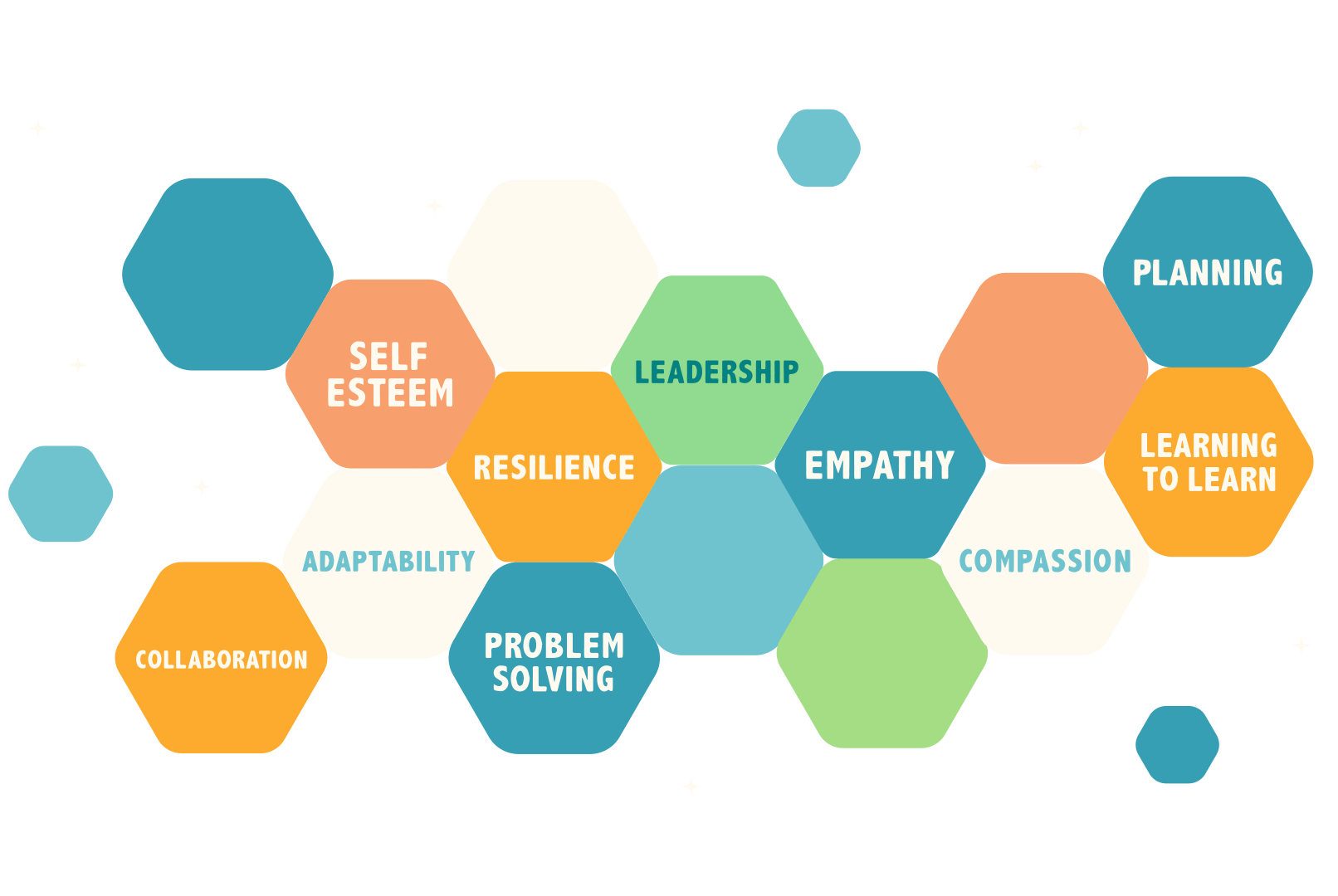| X |
Resilient Learning
Cultivate a growth mindset to embrace challenges, adapt, seek help when needed, and view setbacks as learning opportunities.
| X |
Understanding Myself
Explore identity, values, and goals for self-awareness and purposeful decision-making.
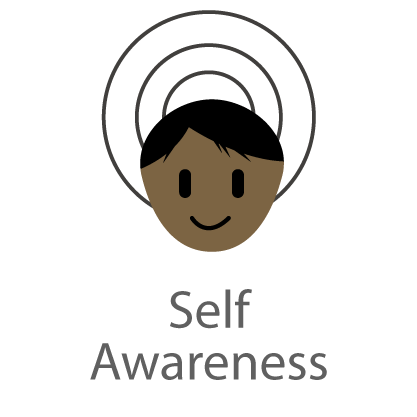
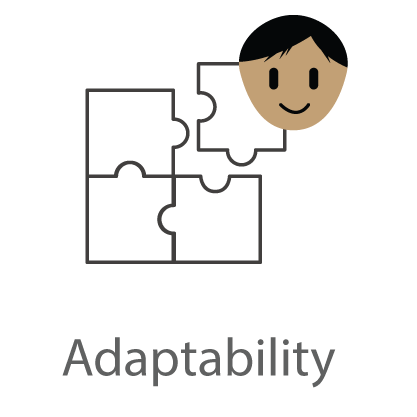
Self-Awareness
Self-Awareness is the ability to see ourselves clearly and objectively through reflection and introspection. It includes recognition of ourselves, our context, our personal qualities, our strengths and weaknesses, our values and beliefs, likes and dislikes, dreams and aspirations, etc., contributing towards our sense of identity. It is also the ability to recognise the contradiction between our aspirations, abilities and values. It is knowledge of our feelings and emotions and how they influence our decisions and behaviour.
Self-Awareness helps us recognise when we are stressed or under pressure. It allows us to see things from the perspective of others, practice self-control, work creatively and productively, and experience pride in ourselves and our work thus contributing to an overall sense of confidence and optimism.
Self-Awareness In Action
The person will be able to:
- Understand their emotions.
- Accurately label emotions and recognise how they are linked to behaviour.
- Analyze how thoughts affect decision making and responsible behaviour.
- Identify their personal strengths and weaknesses.
- Develop personal skills and interests they desire to have.
- Identify their values and beliefs.
- Analyse how personal qualities and values influence choices and successes.
- Accept themselves with a sense of optimism about personal abilities and skills.
- Recognise the different roles they play in the context of age, gender, family, community and school/working place.
- Recognise their rights and duties as individuals and their responsibility towards themselves and society.
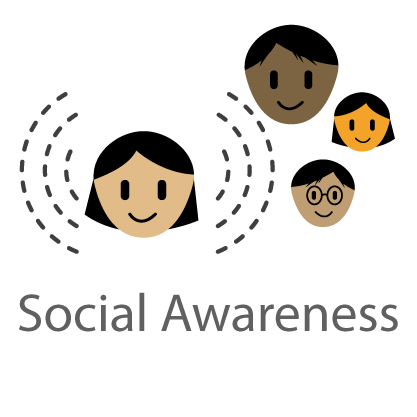

Social Awareness
Social Awareness is the ability to form connections and work with people from diverse backgrounds in terms of religion, caste, gender, socio-economic strata, geographical location etc. It is the ability to understand, empathise and accept people and practices that are different from our own. It is also the ability to recognise and exercise our rights and duties as responsible citizens.
Social Awareness includes being sensitive to local and global environmental concerns, being aware of and involved in addressing social issues, respecting and protecting the rights of others, especially those of vulnerable populations (women, children, elderly, people with disabilities, economically and socially marginalised communities etc.), thus contributing to the collective wellbeing of society.
Social Awareness In Action
The person will be able to:
- Recognise ways in which they and their peers are similar and different.
- Express interest in getting to know their friends’ native language and cultural practices.
- Articulate how a diverse set of friends or members in a team enhances their perspective and life in general.
- Determine the commonalities amongst diverse people – their basic needs, emotions, expectations from others etc.
- Analyze their community’s or neighbourhood’s needs/problems and put together a plan to address those.
- Recognise the vulnerabilities of others and be willing to accept, protect and even help, if needed.
- Show awareness of specific social causes, take a stance and use concrete steps towards addressing them.
- Get involved in organizations and civic bodies that help and contribute towards various social and environmental causes.


Communication
Communication is the ability to express ourselves and respond to people, both verbally and non-verbally, in ways that are appropriate to our culture and situation. This includes listening attentively and respectfully; expressing our opinions and desires, needs and fears in an assertive manner; as well as being able to ask for advice and help in times of need. It is a way of connecting with others by conveying our ideas, facts, thoughts, feelings, and values.
Effective Communication helps us better understand a person or situation and enables us to resolve differences, build trust and respect, and create environments where creative ideas, problem solving, affection, and caring can flourish.
Communication In Action
The person is able to:
- Listen actively without interrupting their peers, friends, teachers, family, etc.
- Recognise when to listen or speak.
- Express their thoughts clearly using verbal and para verbal cues.
- Express themselves in a variety of ways.
- Say ‘’no’’ in an assertive manner without being disrespectful.
- Consider others’ opinions and feelings before responding.


Empathy
Empathy is the ability to emotionally understand what other people feel, see things from their point of view and context, imagine ourselves in their place and respond appropriately. Empathy is relating to others with acceptance, understanding, and sensitivity to their diverse backgrounds, experiences and perspectives, and taking action accordingly.
Empathy plays an important role in being a socially competent person with meaningful social relationships. The ability to empathise is important for promoting positive behaviours towards others, and facilitating social interactions and relationships, thus motivating altruistic behaviour. This skill also makes us challenge intolerance, bias and stereotyping when we see it.
Empathy In Action
The person will be able to:
- Listen well, pay attention to non-verbal communication and pick up subtle cues.
- Understand others’ perspectives and feelings.
- Show sensitivity towards others.
- Help other people based on their understanding of their needs and feelings.
- Respect and relate well to everyone, regardless of their diverse backgrounds.
- Alter the way they interact with others to fit with the others’ diverse needs and feelings.
- Appreciate others for their strengths and accomplishments.
- Provide constructive feedback to others to help them improve.
- Put the needs of others first and look for ways to improve their situations.
| X |
Wellbeing in Action
Learn skills for stress management, mental well-being, and self-care.
| X |
Positive Relationships
Develop communication, critical thinking skills, compassion and emotional awareness to cultivate healthy relationships.

Compassion
Compassion is our ability to feel for others when they are in pain and be motivated to take action to relieve their suffering. It includes five essential elements – recognizing other people’s pain, accepting that human suffering is universal, feeling for the sufferer, tolerating the discomfort it causes to us without being judgmental and feeling motivated to help. It includes the aspect of Global Compassion which refers to compassion felt toward others regardless of their relationship with us, their status, background, membership to any group, and overall circumstances.
Compassion is an enduring skill that is associated with a range of positive attitudes and behaviours towards self, others and humanity as a whole. It is kindness and empathy extended beyond our own people thereby contributing to prosocial behaviour, conflict resolution, and peacekeeping at a global level.
Compassion In Action
The person will be able to:
- Recognize others’ feelings and emotions in particular situations.
- Identify their own feelings and emotions as they witness or hear about another person’s pain, suffering, hardships and misfortunes.
- Recognize how they feel when they hear about a person’s or a group’s suffering who is not related to them.
- Engage in simple acts of kindness on a day to day basis with people within their circle, as well as with strangers and animals.
- Come up with ways in which they can reach out and help others.
- Identify and validate people’s experiences across gender. race, ethnicity, geographical locations, religion, socio-economic strata etc. and show their readiness to help.
- Demonstrate a humane approach towards global problems.
- Commit to causes and put together resources in order to mobilize help.
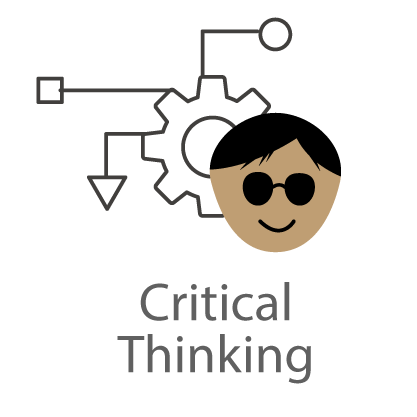

Critical Thinking
Critical Thinking is the ability to question, interpret, analyse, evaluate, infer and explain using reliable evidence and reasoning, conceptual knowledge, clear criteria and relevant context. It helps us solve problems, learn new concepts, develop innovative solutions or make an independent judgement or decision. It is a skill through which we are able to reflect on our own thinking, observe our own biases, ascertain credibility of information, recognise and interpret ambiguous and conflicting information, be open-minded, flexible and fair.
This skill is vital for developing young people to be competent, reflective and independent, valuing reason and truth, while being respectful of others. It is considered a key skill necessary for lifelong learning and navigating an increasingly complex world.
Critical Thinking In Action
The person will be able to:
- Gather information and understanding through framing questions relevant to the context.
- Make correlations between various types of information available.
- Interpret the available information and draw conclusions.
- Analyse the pros and cons of making a decision.
- Reflect and question their own views.
- Notice and examine their own biases.
- Acknowledge reasonable arguments made.
- Synthesise different ideas and opinions.
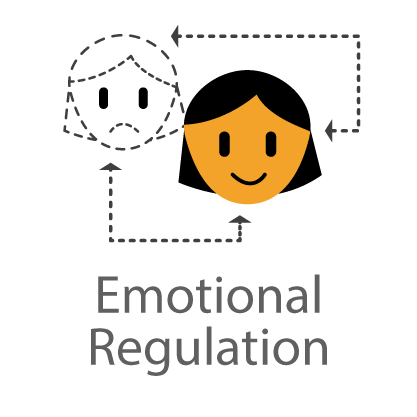

Emotional Regulation
Emotional Regulation is the ability to be aware of, understand and accept our own emotions and control impulsive behaviours when experiencing difficult emotions. It includes the ability to modify strategies for managing our emotions according to situational demands and goals. Emotional regulation takes place through problem solving, assertive behaviour, reevaluation of the situation and de escalation of emotions.
Besides the obvious benefits such as feeling better in the immediate term, strong emotional regulation skills can also enhance long-term wellbeing, improve performance at work, enrich personal relationships and lead to better overall health.
Emotional Regulation In Action
The person will be able to:
- Identify, understand and accept their emotions.
- Express their emotions clearly and openly to others in ways appropriate to the situation.
- Express their feelings and opinions without hurting or disrespecting others.
- Reflect on possible consequences before expressing an emotion or viewpoint.
- Control impulsive behaviour.
- Express hurt without withdrawal, blame or aggression.
- Respond to upsetting situations in healthy and responsible ways.
- Use strategies that allow them to reduce the intensity of their emotions when they need to.


Communication
Communication is the ability to express ourselves and respond to people, both verbally and non-verbally, in ways that are appropriate to our culture and situation. This includes listening attentively and respectfully; expressing our opinions and desires, needs and fears in an assertive manner; as well as being able to ask for advice and help in times of need. It is a way of connecting with others by conveying our ideas, facts, thoughts, feelings, and values.
Effective Communication helps us better understand a person or situation and enables us to resolve differences, build trust and respect, and create environments where creative ideas, problem solving, affection, and caring can flourish.
Communication In Action
The person is able to:
- Listen actively without interrupting their peers, friends, teachers, family, etc.
- Recognise when to listen or speak.
- Express their thoughts clearly using verbal and para verbal cues.
- Express themselves in a variety of ways.
- Say ‘’no’’ in an assertive manner without being disrespectful.
- Consider others’ opinions and feelings before responding.
| X |
Dynamic Teamwork
Cultivate teamwork, problem-solving, and cooperation for achieving goals in groups.
| X |
Inspiring Leadership
Discover and enhance leadership qualities through effective communication and positive influence.
| X |
Exploring Local Context
Investigate and understand the social, cultural, and environmental aspects of the local community.
| X |
Learning to Collaborate
Harness collaboration, diverse perspectives, and practice co-creation to address complex issues.
| X |
Advocacy in Action
Develop planning and research skills to advocate causes, raising awareness, and driving positive change.


Leadership
Leadership is the ability to motivate and organise a group of people towards achieving a common goal. It is the ability to gain the trust and respect of group members by behaving responsibly and in a fair manner, and putting others’ needs before our own. It includes the ability to understand strengths and vulnerabilities of group members, so as to align them with tasks that optimize their performance. Leadership is also the ability to cause changes in other people and social systems.
Leadership skills benefit every aspect of our lives by helping in the development of key personal qualities such as perseverance, being committed and responsible, resilience, self-confidence, etc. Leaders use interpersonal and problem-solving skills to influence and guide others towards change.
Leadership In Action
The person will be able to:
- Lead a group towards achieving a goal.
- Delegate tasks to group members.
- Accept suggestions and inputs from the group members.
- Express confidence in others and their ability to contribute to the group.
- Make others feel valued in the group.
- Influence others through effective use of words and actions.
- View challenges as things that can be overcome with effort and innovative thinking.
- Be receptive to new and unfamiliar ideas, perspectives and experiences.
- Show resilience in tough situations.
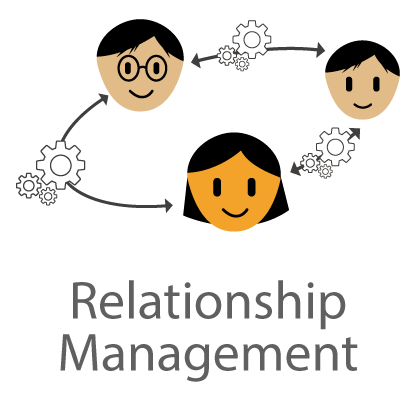

Relationship Management
Relationship Management is the ability to form and maintain healthy, meaningful and rewarding relationships with diverse individuals and groups in both our personal as well as professional domains. It is an important leadership skill and includes the ability to have clear and assertive communication, be honest in our expression of views and emotions, have warm interactions with our family, friends, community, colleagues etc., offer honest and constructive feedback, resist various forms of social pressure and negotiate interpersonal conflicts in mutually beneficial ways. This skill includes both – being aware of our own emotions as well as being considerate of others’ emotions, as we navigate through various social interactions.
Relationship Management skills help us form deeper and richer connections with others in all areas of our life.
Relationship Management In Action
The person will be able to:
- Demonstrate good listening skills in daily interactions with friends, peers, teachers, family etc.
- Communicate clearly and assertively in their day-to-day interactions with others.
- Try out different ways to help out their friends and classmates.
- Seek and offer help when required.
- Express and share their emotions in an open and honest way with their friends, family, etc.
- Work cooperatively and effectively in groups.
- Form teams, influence team members, and boost team morale.
- Resist and manage peer pressure in an effective manner.
- Negotiate conflicts and navigate difficult social situations effectively.


Critical Thinking
Critical Thinking is the ability to question, interpret, analyse, evaluate, infer and explain using reliable evidence and reasoning, conceptual knowledge, clear criteria and relevant context. It helps us solve problems, learn new concepts, develop innovative solutions or make an independent judgement or decision. It is a skill through which we are able to reflect on our own thinking, observe our own biases, ascertain credibility of information, recognise and interpret ambiguous and conflicting information, be open-minded, flexible and fair.
This skill is vital for developing young people to be competent, reflective and independent, valuing reason and truth, while being respectful of others. It is considered a key skill necessary for lifelong learning and navigating an increasingly complex world.
Critical Thinking In Action
The person will be able to:
- Gather information and understanding through framing questions relevant to the context.
- Make correlations between various types of information available.
- Interpret the available information and draw conclusions.
- Analyse the pros and cons of making a decision.
- Reflect and question their own views.
- Notice and examine their own biases.
- Acknowledge reasonable arguments made.
- Synthesise different ideas and opinions.
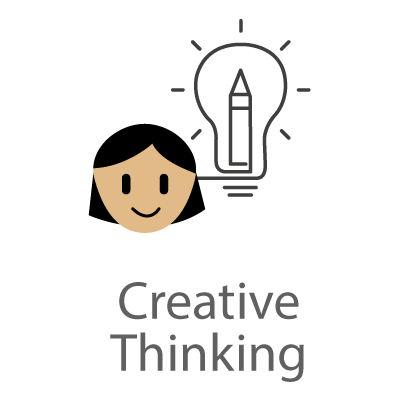

Creative Thinking
Creative Thinking is the ability to engage in the generation, evaluation and improvement of diverse ideas, which can result in original and effective solutions, advancement in knowledge and meaningful expressions of imagination. It involves making connections across topics, concepts, disciplines and methodologies.
Creative Thinking is a vital life skill which enables us to imagine, innovate and respond to unexpected or changing situations. It can improve other abilities like metacognition and problem-solving skills, as well as promote identity development, academic achievement, future career success and social engagement.
Creative Thinking In Action
The person will be able to :
- Follow new approaches and produce original ideas.
- See existing situations in new ways or improve on existing ideas.
- Act on intuition.
- Identify alternative explanations.
- Generate diverse and numerous ideas.
- Generate ideas that are relevant to the requirements of the problem/situation.
- Form unexpected combinations from available information to come up with solutions or new ideas.
- Engage in the task because they find it rewarding, enjoyable and challenging rather than for incentives offered.
| X |
Futures Thinking
Use creative and critical thinking to imagine and anticipate possible futures, considering how our decisions may have ripple effects.
| X |
Innovative Solutions
Embrace curiosity, problem-solving, design and entrepreneurial thinking for addressing real-world challenges.
| X |
Global Citizenship
Foster resilience, compassion, and cognitive flexibility, with a commitment to sustainable peace and social justice.


